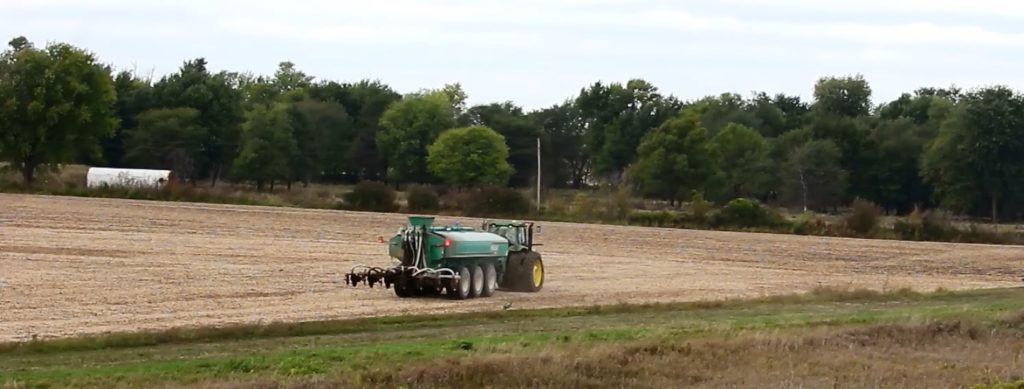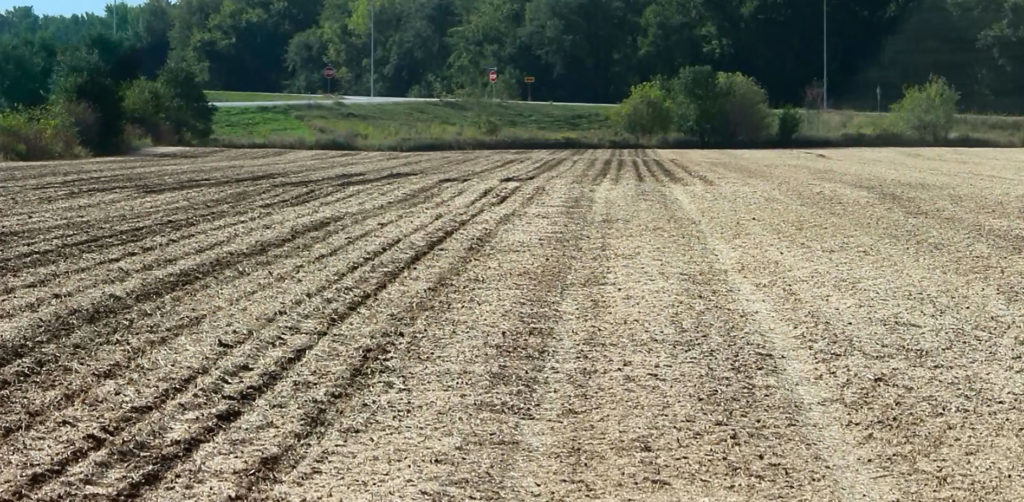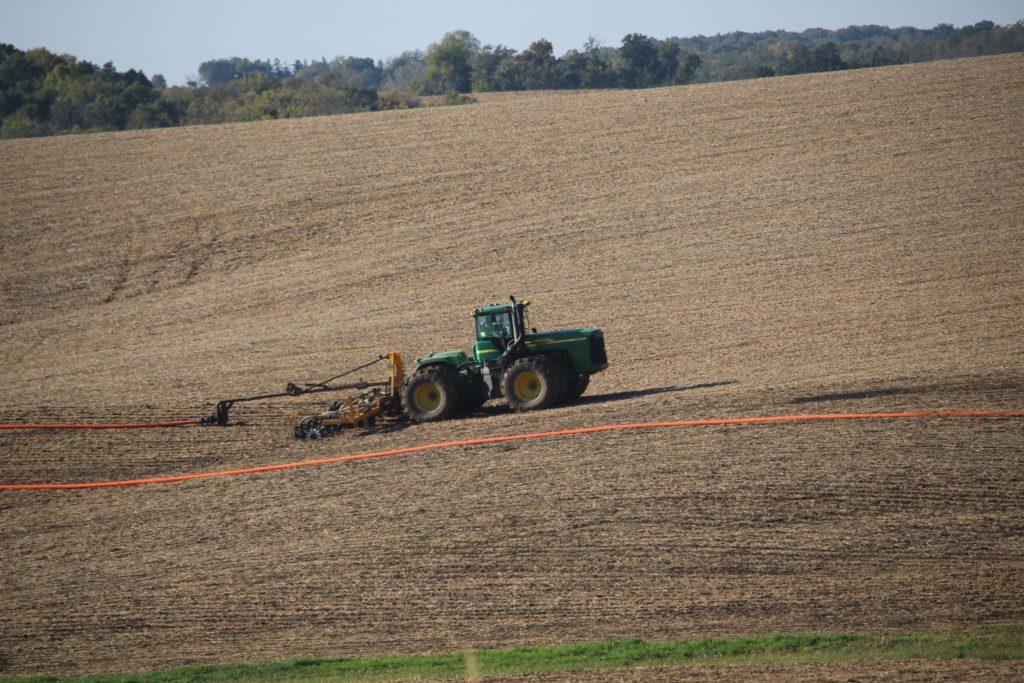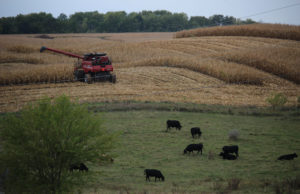Roxanne’s doctor told her that her husband’s experience was used as a learning opportunity for their medical community, because it is so rare.
“You don’t hear about this happening,” she explains. “If you do, it’s because somebody died, not because somebody lived. And that is with me every single day.”
I met Jason Fevold, Roxanne’s husband, last year at the Iowa Pork Congress. He and a coworker, both from Webster City, stopped by the trade show where I was working at a booth displaying farm safety information and gas monitors.
Tractor date
Were they aware of dangerous gases from pits or other confined spaces? Interested in personal gas monitors?
Fevold, a tall, soft-spoken young man, and his friend answered yes.
That Fevold is alive to explain why is extraordinary. He nearly died from exposure to deadly hydrogen sulfide gas.
Jason and Roxanne were on a tractor date in late October 2010. Jason had been working long hours, pumping and spreading liquid manure from a swine nursery building’s deep pit onto a nearby field at the farm where he worked.

To carve out a few hours for the recently married couple to spend together, Roxy brought supper out to the field and rode several rounds in the tractor. It was a beautiful fall evening. They made Halloween plans.
At one of the trips back to refill the tank, Jason went in the confinement building’s office to use the restroom. “Be right back,” he said, before he started the pump to fill the tank.

Some minutes later, Roxanne saw manure slurry splashing out of the top of tank. Something was wrong.
“I took off at a dead sprint towards the building,” she recalls. When she looked in through the doorway into the office area, she saw only Jason’s feet.
She went in. Her lungs burned and the smell was awful. She found Jason lying on the floor, unconscious, with foam at his mouth.
Despite her phone’s low battery, she managed to call 911 and not panic. She credits her composure to training she received for her profession.
Fevold’s older coworker, who was also applying manure with his own rig, was just returning for another tank load. “You have to shut off the tank! We have to get Jason out!” she cried.
The two went in to retrieve Fevold, but they couldn’t pull him out through the doorway he had entered – it was next to the pit opening where the pump was immersed. Instead, they dragged him through the large building to an alternate exit. “It was a 60- or 70-year-old guy and me, dragging 200 pounds of dead weight,” she said.
They had Jason outside by the time fire and ambulance crews arrived from Webster City. Fevold’s coworker was woozy and may have been treated, she thinks. Fevold was vomiting.
Jason’s recollection of the incident is spotty. He remembers washing his hands inside and feeling something was really wrong, he needed to get out; his head was spinning, there was a god-awful loud noise in his ears. That magnified pump noise was the last thing he remembered.
At the emergency room in Webster City, Fevold was in and out of consciousness. His arterial blood gases were being monitored to determine if he could be safely transported to Mercy Hospital in Des Moines.
Late that evening, he was taken to Mercy’s Emergency Department and placed in its cardiac intensive care unit for continuous monitoring of his blood gases and condition. His hospital stay over the next several days involved neurological testing of cognitive function, electrocardiograms, echocardiograms and other diagnostic tests.
Once home, Roxanne said, he was wiped out. And, in typical farmer fashion, asked “when can I go back to work?”
“I was so mad at him,” she remembers, “because that was the last thing I wanted him to do.”
Fevold remained on a work restriction for two weeks and was eventually cleared to return to work by the specialists who cared for him. At the time, he complained he wasn’t being productive, that he should be back helping his boss, who was a man short.
She reminded him, “But we need you here, too.”
Saving grace
The gravity of his incident doesn’t escape Fevold.
“It would have been a lot different if she hadn’t been there,” he reflects. Ordinarily, he and his coworker took turns filling loads, cycling trips to the nursery. That would have meant at least a ten-minute lapse before he might have been found, had Roxy not been there.

“I always have that in the back of my mind. She was the saving grace that day.”
The incident and experience traumatized Roxy too, and seeking help from her doctor was when she discovered how the local medical community learned from Jason’s remarkable survival and recovery. Every memory of that day and the days that followed are crystal clear to her. Including the fact that she, too, had been at risk.
“It is with me every single day: that he could have died, he could not be here. It doesn’t affect him as much, because he doesn’t remember as much. I remember everything.”
Aside from losing his ability to taste for several months – which was later determined the result of trauma to his tongue and taste buds during his seizure while unconscious – Fevold fully recovered.
Looking back, he explains some factors that contributed to the ‘perfect storm.’ The previous day, they had lost a few pigs in one area of the building, even though ventilation was running and curtains were open; this was an indicator of insufficient ventilation. When he had entered the building that evening, manure levels in the pit were low enough that a pump nozzle was exposed above the manure surface, increasing the dispersion of pit gases into the air while the pump operated.

After this incident, the farm made changes to increase safety. They now pump only when the building is empty, so personnel never have to enter to check pig welfare. Doors are locked to prevent entry during pumping. Instead of running tanks, they use a drag line to apply manure to cropland. One person minds the pump and booster pump, both done from outside the building.
Last fall, they contracted out their pumping, due to the late harvest.
So Jason didn’t have to use the hydrogen sulfide monitor he picked up at the trade show. But it’s available if he would need it. Because Roxy and their daughter Lillian need him to use it, too.
Hydrogen sulfide is a deadly gas with no warning properties at dangerous concentrations. It can reach unsafe levels within seconds when manure is agitated. There is no way to reliably predict safe conditions without using gas monitors.
More Information
- UMASH Farm Safety Check: Manure Management
- Penn State Manure Gas Safety
- Great Plains Center for Agriculture Safety and Health Manure Gas Safety
- NASD Manure Gas Dangers
An edited version of Jason and Roxy’s story appeared in Iowa Farmer Today.
Story & photos | Stephanie Leonard


